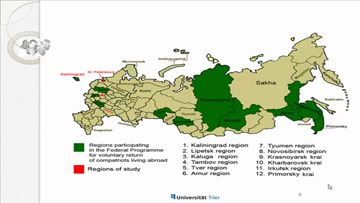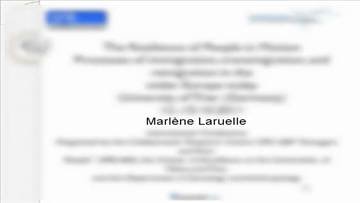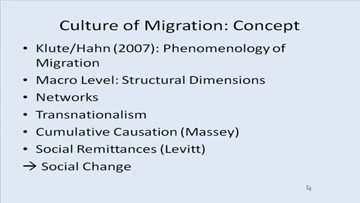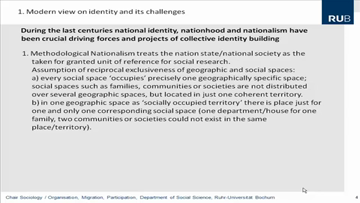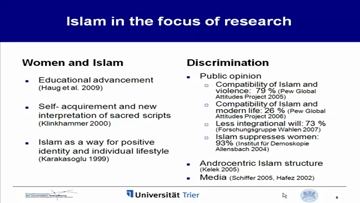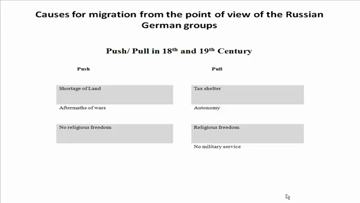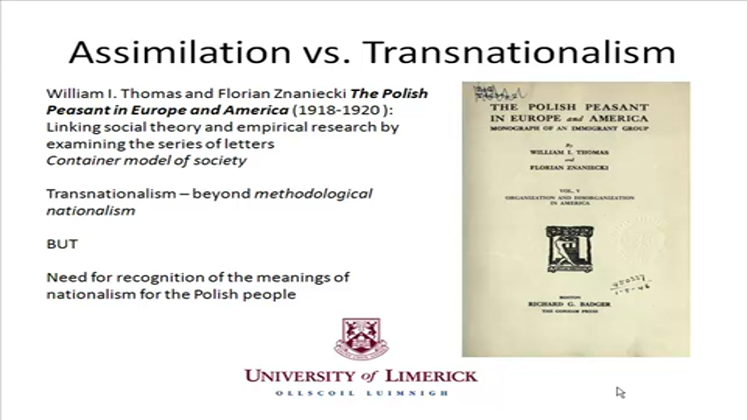Circular Migration Between Ireland and Poland
Designing the Effective Methodology
Mazurkiewicz discusses the methodological challenges in researching circular migration between two suburban locales in Ireland (Newcastle West) and Poland (Tczew) as experienced by the Polish migrants. She sets the background and rationale for researching the peripheries and the sub-urban zones and discusses the specificity of circular migration practiced in the transnational space and outside the (big) city context.
Emigrants from Poland were more likely to travel to and settle in the city. Nonetheless, they have also arrived and settled in the peripheries which can be adequately characterized as areas of security, access to (certain types of) jobs, familiarity of social networks, and functional framework for day-to-day living. In 2006 there was a Polish community present in every town in Ireland. Although some studies of Polish communities in the UK provided insights into the lives of migrants away from London, the ‘urban-centric approach’ continues to be evident in the academic research as an established tradition to explore the ways in which migrants construct social networks and build communities in the highly cosmopolitan urban environments. - The aim of the lecture is to present the specific nature of circular migration to and from the suburban locales. It will discuss how to provide a socio-cultural perspective on the mobile practices of contemporary Polish migrants as they move between non-city sites in Ireland and Poland.
Natalia Mazurkiewicz emigrated to Ireland in 2006. Since 2007 she has been working as an English teacher (TEFL/EAL) in a secondary school in Ireland. She holds two MA degrees in Journalism and Social Communication (Jagiellonian University, Krakow, Poland) and Women`s Studies (University of Limerick, Ireland). She is currently pursuing her PhD thesis at the University of Limerick (Department of Sociology).
Panel VI: The Formation of Identity in Transnational Migratory Processes - October 15th, 2011
The Resilience of People in Motion
-
54498 Hits
-
|
-
2 Votes
-
|
-
16 Beiträge
Processes of immigration, transmigration, and remigration in the wider Europe today
Europe is a continent shaped by migration. Every year millions of people are migrating into the European Union. Others are emigrating from EU member countries. Many are leaving their homes and are trying to integrate into the host country, while others circulate between their home country and their “new home”, leave the country of entry, returning back to their “country of origin”, or they even migrate on to third countries.
Migration is a complex process with constraints and opportunities. Its flows have created different patterns, regimes and even cultures of migration. It involves voluntary and involuntary aspects, economic and non-economic issues, constructions and reconstructions between physical and symbolic spaces. This stipulates also new ways of theorizing and researching in the field.
Strategies of Survival, Strategies of Resistence
Migrants and migratory groups adopt as well as resist to challenges and expectations by the mobility itself or the receiving society. They perform resilient and innovative strategies of survival.
They are resilient by maintaining their culture(s), system(s) of belief, traditions, way of life etc. Yet, they are innovative being open for change, being transformers, innovators, entrepreneurs themselves. Therefore, adoption, change and/or innovation vs. resistance, continuity and/or resilience have to be seen as part of the migratory agency. The migrants’ culture of resilience, meaning the maintenance of core elements of their livelihood, has to be conceptualized in an ever changing world challenging the integrity and cohesion of any, but especially migratory groups.
The Conference
The aim of the conference is to discuss new theoretical approaches, methodologies and empirical research results on immigration, transmigration and re-migration topics. It focusses on changing European migration regimes and discourses since the fall of the iron curtain until today.
Contact
Prof. Michael Schönhuth
University of Trier
Universitätsring 15
D-54286 Trier
+49-(0)6 51-201-27 10 (Office)
http://transmigration.eu/
Zu
The Resilience of People in Motion
